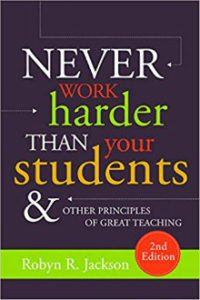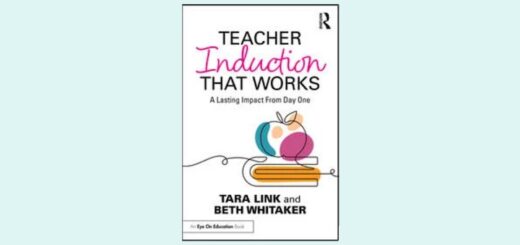A Guide to Becoming a Master Teacher
Never Work Harder Than Your Students & Other Principles of Great Teaching, 2nd Edition
By Robyn R. Jackson
(ASCD, 2018 – Learn more)

A few years ago I read the first edition of Never Work Harder Than Your Students & Other Principles of Great Teaching by Robyn R. Jackson cover to cover. I took the assessment that was included and read through the mastery principles that were to help me build my practice toward the level of a master teacher.
So when I realized there was a second edition of this book, I was very interested to revisit the mastery principles and see what may have been added.

This is exactly the same frame of mind we need as teachers in order to allow ourselves to expand our thinking about teaching and – as Jackson states throughout her book – unlearn some of the strategies and fad teaching ideas that have come our way over the years.
The Master Teacher Mindset
The master teacher mindset is not just about teachers having all the answers. As Jackson states,
“The master teacher mindset also means knowing how to ask the right questions, the kind of questions that lead to deeper thinking, increased motivation, and more student ownership over their work. Master teachers spend more time refining their inquiry skills and their own curiosity than they do collecting strategies and skills.” (page 2)
There are seven “mastery principles” that become the central focus of this book and are used to help guide teachers to grow from being a novice to a master teacher. These principles are:
- Master teachers start where their students are.
- Master teachers know where their students are going.
- Master teachers expect to get their students to their goal.
- Master teachers support their students along the way.
- Master teachers use feedback to help them and their students get better.
- Master teachers focus on quality rather than quantity.
- Master teachers never work harder than their students.
Explaining ‘Never Work Harder than Your Students’
I will take a moment here to note that principle seven, “Master teachers never work harder than their students,” is one that stands out and has received much discussion over the years. Jackson addresses this in her preface, noting that she has heard many comments, some positive and some negative, regarding the idea of how hard teachers work. (Her original point was that students only learn when they are actively engaged in some productive struggle – “doing the work.”)
Jackson clarifies her principle by writing, “What these reactions have in common is that they all miss the point. Never Work Harder Than Your Students is not about letting teachers off the hook for doing their work, nor does it suggest that the work a teacher does is or should be “easy”…Ultimately it’s about masterful teaching, and masterful teaching does take some work.” (page xiv)
A Detailed Focus on Self-Assessment
So, let’s get to the all-important task of the assessment, because really in order to find out where you are, according to the mastery principles, you need to take an honest assessment of your practice.
I began by reading the instructions carefully and noting that I would obtain two scores. The scores were based on the multiple choice a,b,c,d, and each letter given a point value. For instance, if I chose “a” for the first question, then the point value would be 1, “b” choices were worth 2 points, “c” choices were worth 3 points, and “d” choices are worth 4 points. The questions span the seven mastery principles. The first score would be an overall score that would put me within the category of a novice, apprentice, practitioner, or master teacher.
The second score would be the average score for each principle. The scoring sheet would then be used to develop an action plan. In the appendix of the book there are tools to guide you. There are nine tools including “The Master Teacher Trajectory,” “Develop an Action Plan” based on your scores from your assessment, and Tool 3 offering “Sample Action Plan Evidence” to name a few.
I found this scoring to be quite eye opening and the resulting guidance in working through the mastery principles valuable. Maybe it is because it has been a few years since I read the first edition, or maybe it is because so much has happened in education over the last decade, but I found this re-dive into my practice and the development of an action plan eye opening. It helped solidify my quest to achieve every dimension of mastery teaching.
I agree with Jackson that sometimes as educators we get caught up in the “fads” or new strategies rather than staying true to the basic principles of teaching. We need to reflect on what we do and the effect it has on our students. My reflection brought me right back to principle one, “Start Where Your Students Are.”
A Fresh Look at Teacher Evaluations
I noticed updates throughout the book and especially in the new chapter on using the mastery principles during the evaluation process.This section is referred to as “topic” 8, “Taking Control over Your Own Practice.”
Jackson is clear about the changes in evaluation systems as well as state standards since the last edition. “New measures were introduced that seemed to constrict teachers’ choices about what they taught and how they taught. Suddenly teachers focused less on becoming master teachers and simply tried to survive” (page 207). This is a valuable “topic” and delves into understanding the evaluation system and making sense of performance levels, as well as developing an action plan.
If you purchased the first edition years ago as I did, I strongly recommend reading this second edition. Every chapter shares updated information, new tools, and fresh topics, representing Jackson’s own learning over the past decade. This is also a relevant and worthwhile read for teachers unfamiliar with Jackson’s work but intrigued by the idea of becoming a full-fledged master teacher..
Kathleen Palmieri is a fifth grade teacher in upstate New York. With a passion for literacy and learning in the classroom, she participates in various writing workshops and curriculum writing endeavors. As a lifelong learner, she is an avid reader and researcher of educational practices and techniques. Kathleen blogs about books at her blog Books We Love Sharing. Collaborating with colleagues, and globally on Twitter @Kathie042500 is an ongoing practice.





























